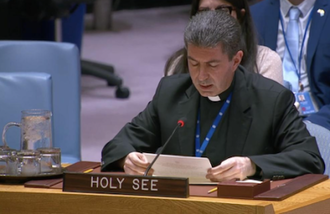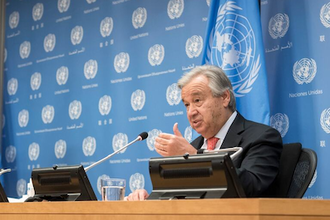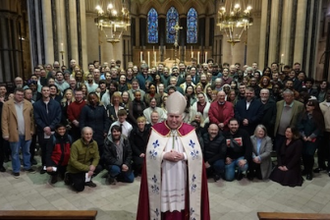Holy See advises UN: Integral human development is a path to lasting peace

Mgr Formica addresses UN
The Holy See Permanent Observer Mission to the United Nations delivered a statement at the recent Security Council Open Debate on Poverty, Underdevelopment, and Conflict: Implications for the Maintenance of International Peace and Security. It was delivered by Mgr Marco Formica, Chargé d'Affaires, and Counselor of the Permanent Observer Mission.
The aim of the debate was to draw attention to the interconnected challenges of poverty, underdevelopment, and conflict. These realities, which often fuel one another, pose serious obstacles to the maintenance of international peace and security as I've often written about here, in the context of the transformative work of the Irish missionary Fr Patrick Devine, founder of the Shalom Centre for Conflict Resolution and Reconciliation in Eastern Africa.
Mgr Formica pointed out that the eradication of poverty in all its forms and dimensions is the greatest global challenge and an indispensable requirement for sustainable development. This shared commitment underscores the urgent moral responsibility to address the root causes of poverty, which are frequently associated with injustice, exclusion, and the denial of fundamental rights.
In 1967, Pope St Paul VI prophetically declared that "development is the new name for peace." As Shalom emphasises, this vision reminds us that peace is not just the absence of war, but rather the active promotion of human fraternity, cooperation and shared prosperity for all. The Holy See maintains that integral human development represents not only a moral imperative for all humankind, but also a concrete path towards a more just, inclusive, and lasting peace.
The Holy See expressed is ongoing concern about the ever-growing military expenditure which diverts significant resources from investments in development sectors such as healthcare, education and infrastructure.
Msgr. Formica renewed the Holy See's request for its proposal for the establishment of a global fund, partly financed by redirecting resources currently allocated to armaments. He said "this fund could make a meaningful contribution to eradicating poverty and hunger, and to promoting development in the world's most disadvantaged regions. This would advance a more just and sustainable path towards peace, and protect and promote human dignity.
The Holy See, like Shalom, point out that lasting peace requires a commitment to integral human development, upholding the God-given dignity of every person and promoting the conditions necessary for justice, solidarity, and the flourishing of all. They emphasise the importance of placing integral human development at the centre of the ongoing review of the peace-building architecture, and of promoting strengthened cooperation among states in the service of peace.
The concepts of negative peace and positive peace entered in the list of terms of conflict/peace discourse and have been amplified by Shalom both in its peace-building activities on the ground in Eastern Africa and also in the lectures delivered by its Executive Director, Fr Patrick Devine who founded the organisation in 2009. Negative peace simply focuses on halting direct, physical violence; while positive peace seeks to end direct, structural and cultural forms of violence, which are found in the economic, political, religious, social and cultural structures of society.
Both negative peace and positive peace are aspects of peacebuilding, and reconciliation is their ultimate goal. Negative peace pertains to peacekeeping, while positive pertains to peacebuilding. Peacekeeping is the maintenance of public security, civil service, and cease-fire arrangements in war and conflict zones by United Nations or regional military, police, and civilian forces with the consent of the nation-state on whose territory these forces are deployed. Peacebuilding refers to policies, and associated efforts to restore stability and effectiveness of the social, political and economic institutions and structures in the wake of a war or some other debilitating or catastrophic event.
In my book: The Theology of Integral Human Development - I illustrate the inter-connectedness of development and peacebuilding. The activities of peacekeepers are the observance where a ceasefire has been brokered and acting as deterrents against renewed violent conflicts, and the conducting of operations to aid or ensure political transitions.
Peacebuilding is comprised of policies, programmes, and associated efforts to restore stability and effectiveness of social, political, and economic conditions and structures in the wake of a war or some other debilitating or catastrophic event. It generally aims to transform and create the conditions to ensure the absence of manifest conflict engagement which involves countering all forms of structural violence and the comprehensive institutionalisation of justice and freedom - respect for human rights and dignity.
Peacebuilding involves a wide range of international organisations, aid agencies, community, and grassroots civil society organisations. The referents of peacebuilding in terms of actors include institutions at the global, continental, regional, and national levels, as well as programmes by community and non-governmental organisations (NGOs).
Shalom - a not-for-profit organisation grounded in Irish missionary work in Africa - is an inspiring example of how peacebuilding should be done, and the benefits it can deliver to local communities and society in general. It is an approach based on integral human development which the Holy See points to as a concrete path towards a more just, inclusive, and lasting peace.
(Matt Moran is an author based in Cork whose writing focuses on religious and social affairs, integral human development, and peacebuilding. He worked for fifteen years in the development sector. "The Theology of Integral Human Development can be obtained from him at mattmoran2021@gmail.com).


















